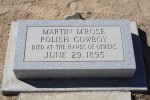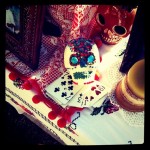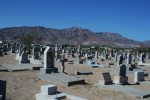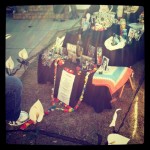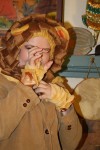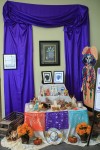EL PASO – During this week we have been presented with three opportunities to reflect on our life and the lives of those who came before us. This year, Halloween also marks the day on which the 7 billionth baby (Danica May Camacho) has joined the world (www.7billionandme.org), giving us an opportunity to contextualize our own life amidst the 6,999,999,999 other souls on the planet, and to consider the planet itself.
Halloween is no longer a child’s holiday; adults are increasingly enamored of costume parties and pumpkin carving. Whether child or adult, the day is a chance for us to be someone or something we are not, not quite, or not yet. In a way, it is liberating. We can imagine ourselves as a super hero for a day, a race car driver, a princess, a monster, a famous person, a butterfly. But why are we fascinated with not being ourselves? Maybe there is something in our choice of costumes that we secretly long to make a part of our everyday lives.
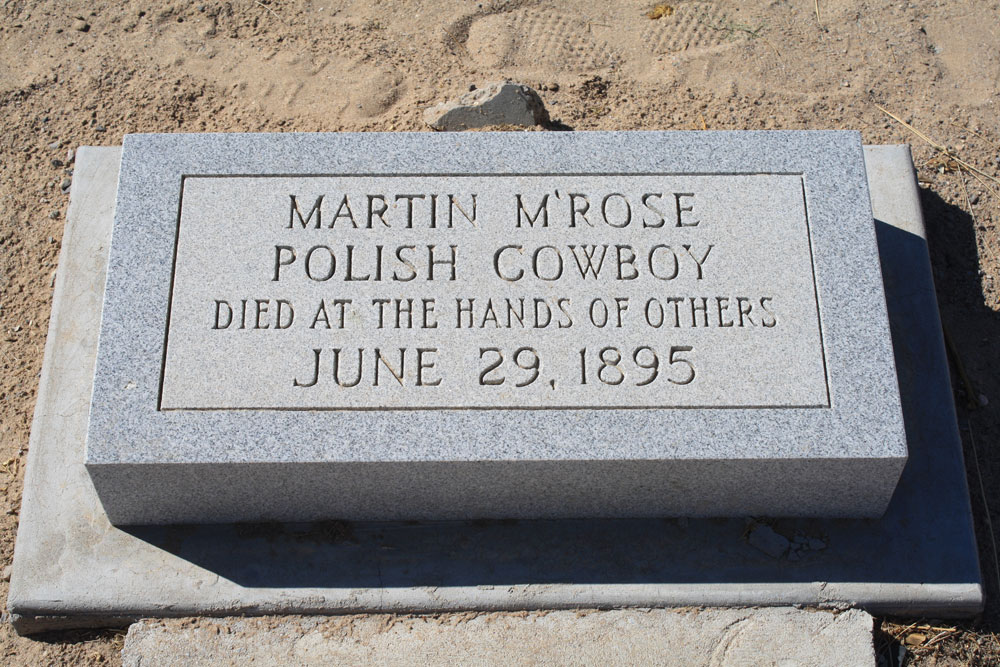
Polish Cowboy Dying the Way He Lived, gravestone near where John Wesley Hardin is buried, Concordia Cemetery. (Cheryl Howard/Borderzine.com)
Día de los Muertos, originating as an Aztec celebration of Mictecacihuatl (Lady of the Dead) in August, has morphed into a Roman Catholic holiday coinciding with All Saints (November 1) and All Souls (November 2) Day. There are many regional variations in the customs associated with this holiday, but all are focused on the remembrance and veneration of the dead. Altars and offerings (ofrendas) are placed in the home, at the grave of the departed, or more recently, in public spaces. Typically included are candles, pan de muerto, other food and drink, candy skulls, marigolds, and mementos of personal significance to the deceased.
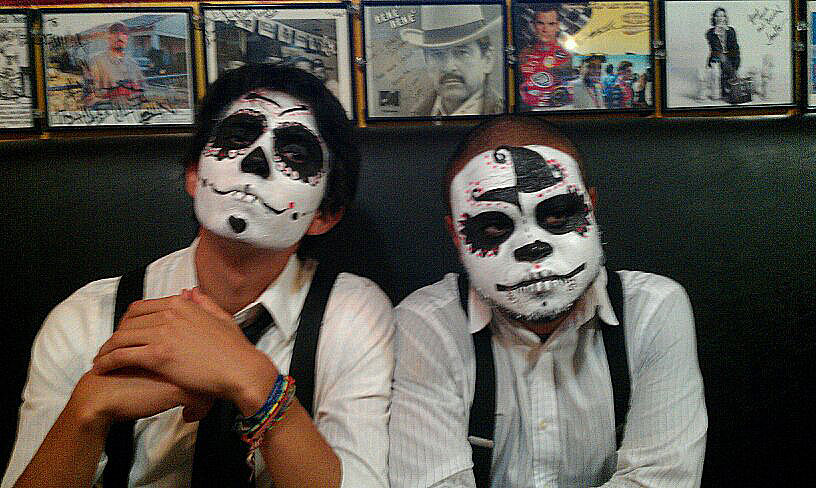
Calacas Raymundo Aguirre and John Del Rosario at L & J's restaurant near Concordia Cemetery, makeup by Josie Jimarez-Howard. (Josie Jimarez-Howard/Borderzine.com)
Stories are told about the dead person, and some believe that the soul will return on that day to visit the living, play music or dance with their calacas (skeletons). Día de los muertos is not a day of sadness, but rather a joyous celebration of the dead. How could we describe ourselves without reference to our parents, living or dead, even if we never knew them? Likewise, the time and place of our birth is intricately tied to who we become, as is our ethnicity and gender. We have no say in any of these factors, nor did our parents, our grandparents, and the ancestors who came before them. No matter how educated or rich or far away we move from our beginnings, they remain with us as long as we are alive.
Nor can we ignore the often intimate relationship between the way we live and the way we die. “Live by the sword and die by the sword” is not just a saying. The people we associate with, the work we do, the activities we engage in or not, what we eat and drink and smoke, all influence the timing and the manner of our deaths. These are some of the things about which we have a choice, or some measure of choice.
Too often we choose unwisely or fail to realize we are choosing. Too often we give up what little power we do have and settle for a superficial, mundane existence. How often have we gone into a tailspin over some silly incident that we won’t even remember five months from now or spent weeks wasting endless hours in meaningless activities? Socrates said “the unexamined life is not worth living.” We might quibble about the meaning of “worth,” but with seven billion people on planet earth, it’s probably time we got down to business before we self-destruct.
Why is it that the people who have looked death squarely in the eye are the very ones who most appreciate living? Who are we really, in all of our disguises? Are we acting like ourselves or trying to be someone else or for someone else? What and who influences us and why? What choices are we making? What is it we want to accomplish in our lives? Who will remember us when we die and what stories will they tell? Is this how we want to be remembered? Isn’t it time we live like we mean it, rattle a few bones, and dance with the skeletons in the closet?
- Polish Cowboy Dying the Way He Lived, gravestone near where John Wesley Hardin is buried, Concordia Cemetery. (Cheryl Howard/Borderzine.com)
- Ofrendas for an altar at Old Mesilla. (Miranda Smith/Borderzine.com)
- Concordia Cemetery. (Cheryl Howard/Borderzine.com)
- An altar at Old Mesilla. (Miranda Smith/Borderzine.com)
- Josie Jimarez-Howard, a cowardly? lion. (Cheryl Howard/Borderzine.com)
- A representation of La Catrina, first characterized by Luis Posada in 1895. (Chery Howard/Borderzine.com)
- An alta at the El Paso Museum of History. (Cheryl Howard/Borderzine.com)
- Calacas Raymundo Aguirre and John Del Rosario at L & J’s restaurant near Concordia Cemetery, makeup by Josie Jimarez-Howard. (Josie Jimarez-Howard/Borderzine.com)


